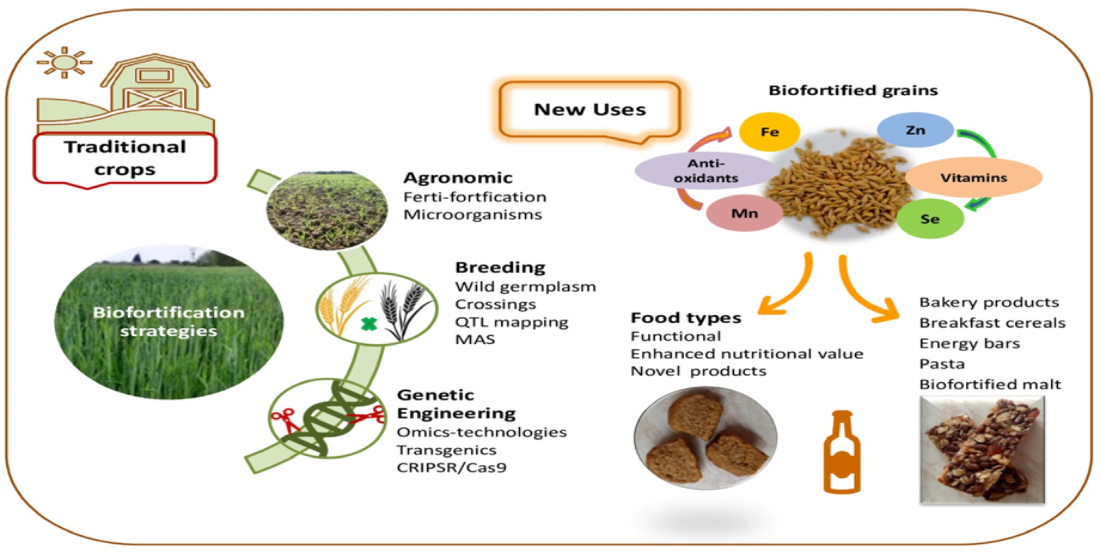Ahmedabad
(Head Office)Address : 506, 3rd EYE THREE (III), Opp. Induben Khakhrawala, Girish Cold Drink Cross Road, CG Road, Navrangpura, Ahmedabad, 380009.
Mobile : 8469231587 / 9586028957
Telephone : 079-40098991
E-mail: dics.upsc@gmail.com

Biofortified seeds
News: The Indian Council of Agricultural Research (ICAR) has developed 142 biofortified seed varieties, including 124 for field crops and 18 for horticultural crops, since 2014.
What are Biofortified seeds?
• Biofortified seeds are a type of seeds that have been bred to have higher levels of certain nutrients. This process is done to increase the nutritional value of the crops that grow from these seeds.
• The process of biofortification can be achieved through various methods including plant breeding, agronomic practices, and modern biotechnological techniques.
• In India, work has begun on the development of biofortified seeds for pulses, wheat, mustard, and millets as well as fruits and vegetables to up the nutrient content to a desired level.
Benefits:
• Improved Health: Biofortification helps in achieving overall health improvement in people. It focuses on iron, zinc, and vitamin A deficiency, which affect a large number of people worldwide.
• Resilience: Biofortified crops are more resilient to diseases, pests, droughts, etc., and provide better yields.
• Accessibility: It has the potential to reach the poorest sections of society who cannot afford food supplements. This method also benefits farmers.
• Addressing Malnutrition: Biofortified crops have a better chance of overcoming the malnutrition problem in the future.
• Micronutrient Intake: Biofortification of staple crops is proven to be an efficacious, acceptable, costeffective, and scalable solution for improving micronutrient intake, micronutrient deficiency status, and other health outcomes
| Fortification | Biofortification |
| This is the process of adding micronutrients (like vitamins and minerals) to food during its processing. | This is the process of increasing the nutritional value of food crops during their growth. The goal is to grow crops that start with more nutrients, rather than adding them later |
| For example, calcium and vitamin D are often added to orange juice, or folic acid to rice and pasta | Plant Breeding, agronomic practices |
| The goal of fortification is to improve the nutritional content of food after it has been harvested | In biofortification, the nutritional micronutrient content is embedded in the crop being grown |

Address : 506, 3rd EYE THREE (III), Opp. Induben Khakhrawala, Girish Cold Drink Cross Road, CG Road, Navrangpura, Ahmedabad, 380009.
Mobile : 8469231587 / 9586028957
Telephone : 079-40098991
E-mail: dics.upsc@gmail.com
Address: A-306, The Landmark, Urjanagar-1, Opp. Spicy Street, Kudasan – Por Road, Kudasan, Gandhinagar – 382421
Mobile : 9723832444 / 9723932444
E-mail: dics.gnagar@gmail.com
Address: 2nd Floor, 9 Shivali Society, L&T Circle, opp. Ratri Bazar, Karelibaugh, Vadodara, 390018
Mobile : 9725692037 / 9725692054
E-mail: dics.vadodara@gmail.com
Address: 403, Raj Victoria, Opp. Pal Walkway, Near Galaxy Circle, Pal, Surat-394510
Mobile : 8401031583 / 8401031587
E-mail: dics.surat@gmail.com
Address: 57/17, 2nd Floor, Old Rajinder Nagar Market, Bada Bazaar Marg, Delhi-60
Mobile : 9104830862 / 9104830865
E-mail: dics.newdelhi@gmail.com